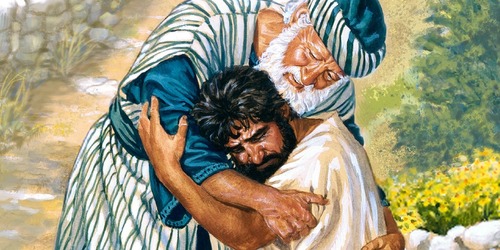Somebody Inside You Is Trying to Get Out!
 Thursday, May 10, 2018 at 02:26AM
Thursday, May 10, 2018 at 02:26AM  “For this reason I bow my knees to the Father of our Lord Jesus Christ … that He would grant you, according to the riches of His glory, to be strengthened with might through His Spirit in the inner man, that Christ may dwell in your hearts through faith; that you, being rooted and grounded in love, may be able to comprehend with all the saints what is the width and length and depth and height—to know the love of Christ which passes knowledge; that you may be filled with all the fullness of God.” Ephesians 3:14-19.
“For this reason I bow my knees to the Father of our Lord Jesus Christ … that He would grant you, according to the riches of His glory, to be strengthened with might through His Spirit in the inner man, that Christ may dwell in your hearts through faith; that you, being rooted and grounded in love, may be able to comprehend with all the saints what is the width and length and depth and height—to know the love of Christ which passes knowledge; that you may be filled with all the fullness of God.” Ephesians 3:14-19.
The presence of the Holy Spirit in the life is evidence of salvation as we read in Romans 8:9, but the power of the Spirit is enablement for Christian living, and it is this power that God desires for his people. “But you shall receive power when the Holy Spirit has come upon you.” Acts 1:8. Jesus performed His ministry on earth in the power of the Spirit (Luke 4:1, 14; Acts 10:38), and this is the only resource we have for Christian living today. As you read the Book of Acts, you see the importance of the Holy Spirit in the life of the church, for there are some fifty-nine references to the Spirit in the book, or one fourth of the total references found in the New Testament. Someone has said, “If God took the Holy Spirit out of this world, most of what we Christians are doing would go right on—and nobody would know the difference!” This sad state must be rectified. We are here to precisely make a difference!
The power of the Spirit is given to us “according to the riches of His glory,” Ephesians 3:16. God gave us the Holy Spirit to indwell and empower His people. It is not necessary for us to “work something up.” The power was sent down. How marvelous that God does not give the Spirit’s power to us “out of His riches” but “according to”—which is a far greater thing. If I am a billionaire and I give you ten dollars, I have given you out of my riches; but if I give you a million dollars, I have given to you according to my riches. The first is a portion; the second is a proportion!
This power is available for “the inner man,” meaning the spiritual part of our being where God dwells and works. The inner being of the lost sinner is dead, but it becomes alive when Christ is invited in. “And you He made alive, who were dead in trespasses and sins.” Ephesians 2:1. You would be amazed at the characteristics of the inner being. The inner being:
- Can see. “Open my eyes, that I may see Wondrous things from Your law.” Psalm 119:18.
- Can hear. “He who has ears to hear, let him hear!” Matthew 13:9.
- Can taste. “Oh, taste and see that the LORD is good.” Psalm 34:8.
- Can feel. “Seek the Lord, in the hope that they might grope for Him and find Him.” Acts 17:27.
- Must be exercised. “Exercise yourself toward godliness.” 1 Timothy 4:7.
- Must be cleansed. “Wash me, and I shall be whiter than snow.” Psalm 51:7.
- Must be fed. “Man shall not live by bread alone, but by every word that proceeds from the mouth of God.” Matthew 4:4.
The outer being is perishing, but the inner being can be renewed spiritually in spite of outward physical decay. This same inner power makes him succeed. What does it mean to have the Holy Spirit empower the inner being? It means that our spiritual faculties are controlled by God, and we are exercising them and growing in the Word. (Hebrews 5:12–14).
It is only when we yield to the Spirit and let Him control the real you that we succeed in living to the glory of God. This means feeding the inner being the Word of God, praying and worshiping, keeping clean, and exercising the senses by loving obedience. You must strive to make the outer being an extension of the inner being!







